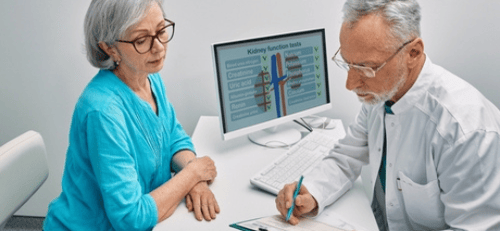Digestive health is a crucial aspect of overall wellness, and many people experience gastrointestinal issues at some point in their lives. It can be challenging to determine when to visit a primary care physician and when to consult a specialist, such as a gastroenterologist. In this blog, we will discuss common gastrointestinal symptoms that may warrant a visit to a gastroenterologist, who specialises in the diagnosis and treatment of digestive system disorders.
The Meaning of a Gastroenterologist
A gastroenterologist is a medical doctor who specialises in the diagnosis and treatment of diseases and disorders affecting the gastrointestinal (GI) tract. This includes the oesophagus, stomach, small intestine, large intestine (colon), rectum, pancreas, gallbladder, bile ducts, and liver. Many gastroenterologists also receive extensive training in endoscopy (use of very small camera attached to long cables to directly visualise the mouth, oesophagus, stomach, parts of the small intestines, and the large intestine down to the anus) to perform various diagnostic procedures and therapeutic interventions.
8 Symptoms That Warrant a Visit to a Gastroenterologist in Hong Kong
While many gastrointestinal symptoms can be managed with conservatively with over-the-counter medications or lifestyle changes, some symptoms may indicate a more concerning issue that requires specialised care. If you experience any of the following symptoms, it may be time to consult a gastroenterologist:
-
Persistent Heartburn or Acid Reflux
Heartburn, also known as acid reflux, is a burning sensation in the chest that occurs when stomach acid backs up into the oesophagus even to the upper airway. Occasional heartburn is common and can usually be managed with over-the-counter antacids. However, if you experience heartburn more than twice a week, it may be a sign of gastroesophageal reflux disease (GERD), which requires medical attention.
-
Difficulty Swallowing (Dysphagia)
Dysphagia is the medical term for difficulty swallowing. It can be caused by a variety of factors, including muscular or neurological problems, inflammation, or blockages in the oesophagus. If you consistently have trouble swallowing or feel like food is getting stuck in your throat, it's essential to see a gastroenterologist to determine the underlying cause and receive appropriate treatment.
-
Unexplained Weight Loss
Losing weight without trying can be a sign of an underlying gastrointestinal problem, such as Crohn's disease, ulcerative colitis, or even cancer. If you've experienced significant weight loss (persistent, unintentional loss of more than 5 per cent of your weight over 6 to 12 months) and can't pinpoint a reason, it's crucial to consult a gastroenterologist to rule out any serious conditions.
-
Persistent Abdominal Pain
Occasional abdominal pain can be attributed to a variety of causes, such as indigestion or gas. However, if you experience persistent or severe abdominal pain that doesn't improve with over-the-counter remedies, it may be time to see a gastroenterologist. Persistent abdominal pain can be a sign of various GI issues, including inflammatory bowel disease (IBD), irritable bowel syndrome (IBS), or diverticulitis.
-
Changes in Bowel Habits
Changes in bowel habits, such as constipation, diarrhea, or alternating between the two, can be a sign of an underlying gastrointestinal issue. If you notice a persistent change in your bowel movements, it's essential to consult a gastroenterologist to determine the cause and receive appropriate advise and treatment.
-
Rectal Bleeding
Rectal bleeding can be a symptom of several gastrointestinal conditions, including haemorrhoids, anal fissures, diverticulitis, colorectal cancer or certain medications (like aspirin, anticoagulants or NSAIDS). If you notice blood in your stool or on toilet paper after wiping, it's crucial to consult a gastroenterologist to receive a proper evaluation and diagnosis.
-
Chronic Gas and Bloating
Excessive gas and bloating can be uncomfortable and embarrassing. While these symptoms are common and can often be managed with dietary changes, they may also indicate an underlying GI issue, such as IBS, lactose intolerance, or small intestinal bacterial overgrowth (SIBO). If you consistently experience gas and bloating, it's essential to consult a gastroenterologist for further evaluation and treatment.
-
Persistent Nausea and Vomiting
Nausea and vomiting can be caused by various factors, such as food poisoning, viral infections, or even motion sickness. However, if you experience persistent, unexplained nausea and vomiting, it may be a sign of a more severe gastrointestinal issue, such as gastroparesis or peptic ulcers or even tumours. In such cases, a gastroenterologist can help diagnose and treat the underlying cause.
How to Prepare for Your Gastroenterologist Appointment
When you schedule an appointment with a gastroenterologist, it's essential to come prepared with information about your symptoms and medical history. Be ready to discuss:
- The specific symptoms you're experiencing, including their frequency, severity, and duration
- Any over-the-counter medications or remedies you've tried
- Any relevant family medical history, such as a history of gastrointestinal issues or cancer
- A list of your current medications, including prescriptions, over-the-counter medications, and supplements
It can also be helpful to keep a symptom diary leading up to your appointment, detailing when your symptoms occur, what you were doing at the time, and any potential triggers (such as specific foods or activities). This information can assist your gastroenterologist in determining the cause of your symptoms and developing an appropriate treatment plan.
When to Consult with a Gastroenterologist
Always consult a healthcare professional when in doubt about the severity or nature of your symptoms. Early intervention can lead to more effective treatment and better outcomes. If you're experiencing any of the discussed symptoms or have concerns about your digestive health, don’t hesitate to consult a gastroenterologist.
References
- Unintentional Weight Loss. Retrieved 12 January 2024. From, https://www.nidirect.gov.uk/conditions/unintentional-weight-loss#:~:text=to%20be%20treated.-,How%20much%20weight%20loss%20is%20a%20concern,be%20a%20sign%20of%20malnutrition.
-
Gastroesophageal Reflux Disease (GERD). (2023). Mayo Clinic. Retrieved 12 January 2024, from https://www.mayoclinic.org/diseases-conditions/gerd/symptoms-causes/syc-20361940
-
Dysphagia. (2023). Cleveland Clinic. Retrieved 12 January 2024, from https://my.clevelandclinic.org/health/diseases/15038-dysphagia
-
Inflammatory Bowel Disease (IBD). (2023). Centers for Disease Control and Prevention (CDC). Retrieved 12 January 2024, from https://www.cdc.gov/ibd/what-is-IBD.htm
-
Rectal Bleeding. (2023). Harvard Health Publishing. Retrieved 12 January 2024, from https://www.health.harvard.edu/a_to_z/rectal-bleeding-a-to-z
 Central General Practice
Central General Practice
 Repulse Bay
Repulse Bay
 Clearwater Bay
Clearwater Bay
 BodyWorX Clinic
BodyWorX Clinic
 Central Specialist Clinic
Central Specialist Clinic
 MindWorX Clinic
MindWorX Clinic
 Partner Clinics
Partner Clinics
 Family Clinic
Family Clinic
 OT&P Annerley Midwives Clinic
OT&P Annerley Midwives Clinic





